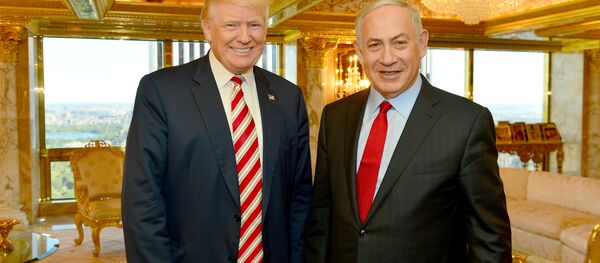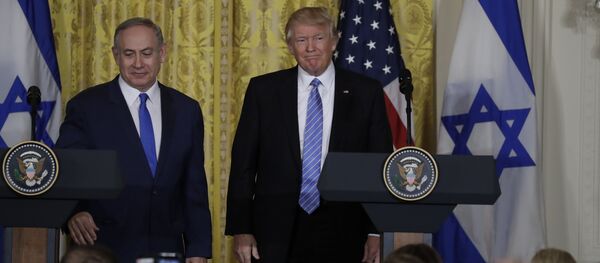Last week, US President Donald Trump met Israeli Prime Minister Benjamin Netanyahu for the first time since his election victory in November.
Prior to the meeting, the Trump administration made a significant break with decades of US foreign policy when it said that Washington will not insist on a two-state solution to the Israeli-Palestinian conflict.
"Maybe, maybe not," an official said of the two-state solution. "It's something the two sides have to agree to. It's not for us to impose that vision. But I think we'll find out more about that tomorrow."
At a joint news conference with Netanyahu, Trump reiterated that Washington is not attached to the two-state solution.
"I'm looking at two states and one state, and I like the one both parties like. I can live with either one," the US President said.
On Sunday, Israel's Haaretz newspaper reported that the Obama administration had brought together Netanyahu, Egyptian President Abdel Fattah al-Sisi, Jordan's King Abdullah and US Secretary of State John Kerry for talks that aimed to result in a regional consensus on the Israeli-Palestinian peace process.
The secret summit took place February 21 in the Jordanian Red Sea resort of Aqaba. However, the initiative stalled after Netanyahu withdrew his initial support due to opposition within his government.
Netanyahu and his Likud party head a right-wing coalition government featuring hardliners such as Defense Minister Avigdor Lieberman, who once suggested bombing Egypt's Aswan Dam and in 2013 called for Israel to reconquer the Gaza Strip and carry out a "thorough cleansing."
Professor Neve Gordon of SOAS University of London told Radio Sputnik that while Netanyahu's room for negotiating a two-state solution with Palestine is indeed restricted by his government, the Prime Minister himself is uncommitted to the idea.
"I don't think Netanyahu wants to withdraw from the territory Israel occupied in 1967. I think ideologically, he's for the greater Israel and I think that pragmatically, he doesn't have the courage because what's most important for him and has been throughout his career is maintaining his position rather than carrying out political change," Gordon said.
"His allies in the coalition are on the right and many are further right than him. Therefore he had to make a certain calculation whether he wanted to maintain this coalition or try to change it and carry out a courageous act that I'm not sure he believes in. so, the odds of anything actually happening were close to zero."
"Netanyahu is interested in maintaining the status quo. Every time there are negotiations between Israel and the Palestinians or the Americans or other parties, then the settlement project in the colonized territories actually expands. So, the status quo is actually used to deeper and bolster Israel's colonial project."
A two-state solution is supported by the international community and a majority of Israelis and Palestinians, but the governments of Israeli and Palestine have been unable to reach a peace deal.
"These issues are not going to go away, and it doesn't matter which parties are going to be invited to the table and when. So, I think it's all about stalling, it's all about maintaining the status quo as Israel incrementally creates more and more settlements and moves more and more settlers from the pre-1967 borders into the West Bank," Gordon said.
"I would say that a contiguous Palestinian state is no longer really an option, and the terms of the debate and issues need to change. What we actually need is a paradigm shift, from a two-state solution to a one state."
"The question now should be, instead of two states and how to reach two states, what do we do with this one state. How do we take one state that is in many respects an apartheid regime, and democratize it? How do we create power-sharing between Israeli Jews and Palestinians in this one state?" Gordon said.
"Trump tells Netanyahu,' it can be two states, it can be one state' and brushes aside 30 years of US diplomacy, but he suddenly opens up a certain debate about the one state. This was not his intention, but now the President of the US says we can start speaking about one state, OK, let's start speaking about one state. What does one state mean, who are citizens in this one state, why are the Palestinians currently not citizens in this one state and so forth."
Have you heard the news? Sign up to our Telegram channel and we'll keep you up to speed!





